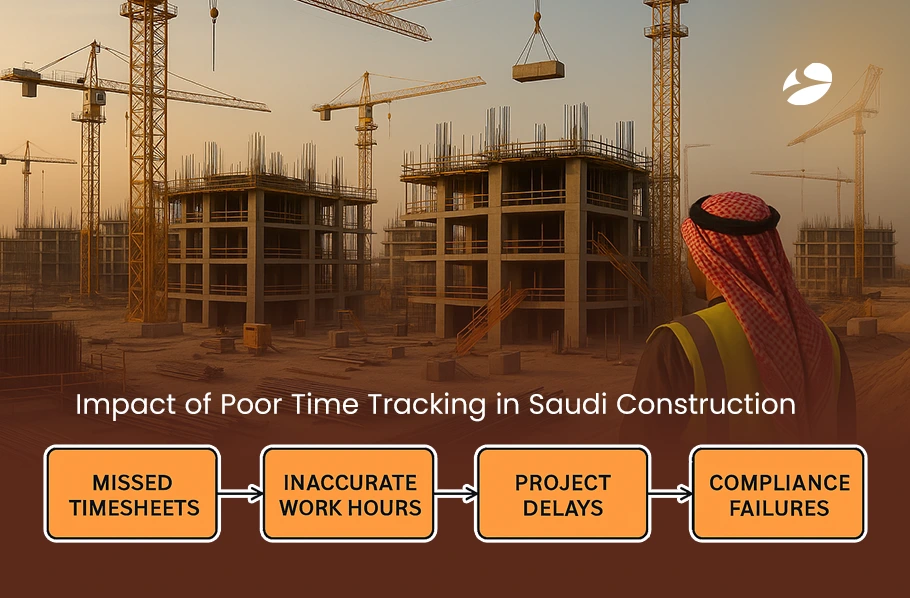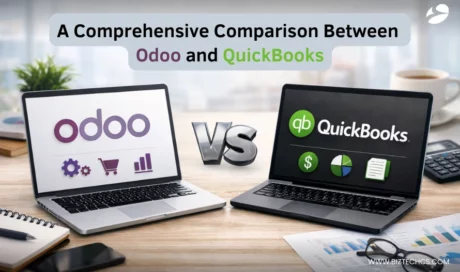2511
How Odoo Timesheets Transform Project Cost Tracking in Saudi Arabia?
5 min read
2511
5 min read
Not all Project Management tools give timesheets. The delta of Resource Planning and Project Management is the key for cost analysis. For your internal costs as well as to meet requests from your clients.
It is one of the known heavy lifts within organizations to implement a proper tangent of Project management and resource planning. On the 11th hour, when your CFO walks into the boardroom, and the managing director asks a simple question: “What did we spend on labor across our Dammam sites last month?”, goes on the books as a mismanaged Project.
It’s the sound of data trapped in WhatsApp messages (Or Slack), scattered across Excel sheets (Or Basecamp, Monday, etc.), and buried in site supervisors’ notebooks. It’s the reality that keeps Saudi contractors awake at night—knowing that labor represents 30-40% of project costs, yet having no real-time visibility into where those riyals are flowing.
One CFO recently asked us, “If labor makes up nearly half of our costs, why don’t we already have real-time visibility?” The answer isn’t a lack of discipline or talent—it’s the systems. Traditional tools like WhatsApp, Excel, and notebooks were never built for scale, compliance, or the accountability demanded by Vision 2030. Even if you have modern tools but they aren’t fully integrated – you have a challenge at hand to map the data that affects decision making.
You’re not alone in this struggle. 85% of construction projects globally experience cost overruns, with an average overrun of 28% (source).
In Saudi Arabia’s construction sector, the average Construction Foreman earns around SAR 155,079/year, which works out to roughly SAR 75/hour (≈ USD 20–21/hr). When labor already takes up 30–40% of project costs, mis-tracking even a few hours here and there adds up fast (source). With Vision 2030 driving rapid, high-accountability projects, every labor hour counts.
In this environment, proper timesheet management isn’t just about compliance — it’s about survival.
Without effective project cost tracking in Saudi Arabia, you’re essentially flying blind. And in a market where margins are already razor-thin, that’s a risk no contractor can afford to take.
Despite the scale of Saudi Arabia’s construction projects, many contractors still rely on outdated, manual time tracking. This disconnect is costing far more than just hours—it’s costing control, accuracy, and profit.
The Hidden Tax of Manual Processes – Let’s be brutally honest about what’s happening on your sites right now. Foremen are collecting timesheets. However, some send crews WhatsApp photos of handwritten logs, while others submit weekly Excel sheets. Temporary contractors are often completely off the radar until payroll sounds the alarm. If an auditor walked onto your site tomorrow and asked for last week’s verified labor hours by project phase, how long would it take to produce that report?
We’ve seen the answer play out repeatedly. It takes days of chasing WhatsApp messages, calling supervisors, and reconciling mismatched spreadsheets. Even then, the numbers presented are what you hope are correct, not what you know to be true. In just the first half of 2024, Saudi Arabia awarded USD 49.3 billion (SR 185 billion) in construction contracts. That’s a 47% jump compared to the previous year. Projects are scaling fast. Manual reconciliation can’t keep up (source).
At this point, a project director might ask: “But if my teams are already submitting logs, why is the reporting still unreliable?” Because submission doesn’t equal verification. In manual systems, foremen may send in data, but there’s no built-in audit trail, no automated cross-check, and no way to ensure hours logged match actual site presence. With Odoo, every entry is timestamped, traceable, and tied back to crews—turning questionable numbers into trusted data.
Odoo Consultant Tip: Always configure timesheet validations with automated approval rules tied to project phases. This ensures data integrity while reducing unnecessary supervisor workload. It’s a small step that prevents errors from slipping into payroll or compliance reports.
With the right Odoo configuration, you can generate that same report in 30 seconds, complete with a full audit trail for every entry.
The consequences of sticking with outdated methods aren’t just operational—they’re financial. Construction delays can add up to 20% over the original budget, and over 40% of contractors cite unrealistic scheduling and unclear resource availability as key reasons. Saudi Arabia holds 39% of the USD 3.9 trillion unawarded construction pipeline in MENA. Local contractors are competing for the lion’s share of the region’s mega-projects. But without accurate, real-time labor visibility, winning bids is one thing. Delivering profitably is another. Without real-time visibility into labor utilization, every decision becomes a risk. Every estimate becomes a shot in the dark.
Over the years of implementing Odoo ERP for construction firms across the Kingdom, we’ve learned that the issue isn’t about people. It’s not lazy supervisors or resistant workers. The real problem is systems that don’t reflect how Saudi construction actually works.
Crews here operate like brothers, not isolated units. Supervisors manage through relationships, not command chains. ERP systems that ignore this reality become just another expensive failure.
The key to effective timesheet management in Saudi Arabia isn’t to force a Western workflow. It’s about configuring Odoo to align with your operational culture, delivering the accuracy, transparency, and cost control needed to stay competitive.
In Saudi Arabia’s construction sector, labor compliance is no longer optional—it’s mission-critical.
With Saudization quotas, regulated overtime, and site safety audits becoming more frequent and more detailed, contractors are under growing pressure to track labor data with absolute accuracy.
And yet, most still rely on manual timesheets and disconnected records.
Then the request hits your desk:
A key client—perhaps a government entity preparing for a review of a giga-project—demands a detailed labor allocation report. They want to know the workforce nationality ratios, the overtime logged per trade, and how teams were deployed across project phases. Deadline? Tomorrow morning.
You’ve seen how that plays out.
A mad scramble across finance, HR, and site admin. Spreadsheets flying. WhatsApp messages to foreman. Three days of chaos to deliver a report no one fully trusts—and that wouldn’t stand up to an audit.
But there’s another way.
A system that provides instant access to accurate, organized, and audit-ready data. One that turns a last-minute request into a few clicks. No stress. No guesswork. Just clean, credible reporting.
And that matters. Because in Saudi Arabia’s relationship-driven, regulation-heavy construction market, the ability to prove you’re in control isn’t just good operations—it’s a competitive edge.

Every successful digital transformation starts not with software, but with clarity—turning scattered workflows into structured insight.
At BiztechCS, we can help you address one thing most ERP firms overlook: you can’t digitize chaos. Before configuring any Odoo timesheet or cost control module, we take a step most skip—we map your operational truth.
That means sitting with your operations team, not just your department heads, and sketching how work really flows on your sites. We don’t impose theoretical workflows; we trace what your teams actually do. From excavation to foundation, superstructure to MEP, and finishing—those become your cost buckets inside Odoo.
But here’s what BiztechCS can bring that others don’t: success comes from aligning the system with how your crews already operate.
We configure Odoo using your terminology, your sequencing, your rhythms. This isn’t a generic ERP rollout. This is structured, strategic alignment—technology molded to fit your business culture.
And that brings us to the game-changing question we always ask during implementation:
“Do your crews work individually or as units?”
In Saudi construction, they almost always work as units. Your Egyptian mason crew has probably worked together for years. They move in sync. They cover for each other during prayer times. Their productivity is built on trust and rhythm. Forcing individual clock-ins? It disrupts that flow.
That’s why BiztechCS can configure crew-based time entries in Odoo. The foreman enters hours for his entire team using smart defaults. And yet, in the background, we still capture individual-level data for compliance, analytics, and forecasting when you need it. A common question from managing directors is: “If we switch to crew-based entries, will we lose individual accountability?” The short answer is no. Odoo allows supervisors to log hours for the group while still storing individual-level data in the backend. That means you preserve the natural crew rhythm without sacrificing the granularity required for compliance audits, performance benchmarking, or forecasting.
Even the most sophisticated ERP becomes worthless if it forces artificial workflows. In the Kingdom’s construction sector, cultural work patterns are your edge. When your systems work the way your people naturally do, adoption isn’t forced—it happens on its own.
The result? A system your people actually use. Cost visibility you trust. And a foundation built for Phase 2—real-time cost control at scale.
Odoo Consultant Tip: During implementation, we recommend setting up dynamic cost buckets directly mapped to your WBS (Work Breakdown Structure). This allows labor hours logged by crews to automatically flow into cost centers—removing manual reconciliation and speeding up reporting.
Turn operational chaos into structured visibility with Odoo configured for the way your crews actually work. BiztechCS helps you build systems your people embrace—and your projects can scale on.
The Non-Negotiable Reality: Your sites aren’t air-conditioned offices with reliable WiFi. They’re remote, high-pressure environments where work starts before dawn, where dust storms interrupt signals, and where crews speak a dozen different languages. Standard ERP implementations fail here because they assume stability—stable connections, stable workflows, stable conditions.
Here’s where BiztechCS’s implementation expertise becomes invaluable. While Odoo offers robust mobile capabilities, it’s designed out of the box for Western office environments. We take that foundation and re-engineer it for Saudi construction—on the ground, in the field, and in sync with your real-world operations.
BiztechCS Configuration Approach:
A supervisor arrives at 6 AM for his morning rounds. He opens the Odoo app we’ve tailored for his routine. Crew hours from the previous day are already filtered by team. Two taps to approve. One swipe to flag issues. No chasing signatures. No lost papers. No end-of-month surprises. And what changes when supervisors can approve timesheets during those site walks? We’ve consistently seen overtime drop by 20–30%, because issues surface immediately, not weeks later.
Productivity conversations happen in real time, while the work is still fresh. This often prompts executives to ask: “Isn’t overtime just part of the business? Can software really reduce it?” Yes, overtime is common—but unchecked overtime is costly. What Odoo does is reveal the why behind those hours. By surfacing issues immediately—whether it’s equipment downtime, workflow bottlenecks, or genuine overwork—leaders can act in real time. The result isn’t eliminating overtime, but optimizing it: ensuring it reflects project needs, not inefficiencies. And perhaps most importantly, the system gets used because it works the way supervisors work.
We’ve seen too many million-riyal ERP systems fail—not because the software was bad, but because consultants configured them as back-office accounting tools. That approach doesn’t work in Saudi construction. At BiztechCS, we do it differently. We spend time on-site. We observe. We listen. We watch how your teams actually operate. And then we configure Odoo to support their reality—not force them into someone else’s workflow.
This isn’t just software configuration. It’s operational alignment—one that delivers real ROI because it’s built on how your people work, not how someone thinks they should.
Real-time cost tracking in Saudi construction projects is no longer a luxury—it’s a competitive advantage. BiztechCS can help turn your Odoo ERP into a dynamic decision-making engine, not just a reporting tool.
Log into your construction dashboard on Monday morning and instantly see,
With this level of insight, your CFO no longer fears tough questions about labor cost visibility. Project managers stop reacting late and start leading with data. Estimators base new tender pricing on actual historical performance from your ERP, grounded in Saudi civil construction realities, not optimistic guesses.
Naturally, tender committees often ask: “Can this data really give us a competitive edge in bidding?” Absolutely. When tenders are priced based on verified labor performance, you can bid aggressively with confidence. Instead of padding estimates to cover unknowns, you sharpen them using actual crew productivity data, overtime history, and cost benchmarks. This precision not only helps win projects but also ensures profitability post-award.
So here’s the strategic question every construction leader should ask:
If you could detect cost overruns as they develop—instead of uncovering them weeks later in monthly reports—how much could you save?
Our experience with dozens of Odoo ERP implementations reveals that the answer is significant: early detection and intervention typically result in 10–15% savings in overall project costs. Board members often challenge us with: “What’s the real payback period on this investment?” From our Saudi implementations, most contractors see measurable ROI within the first major project cycle.
This is especially relevant now: according to Saudi Arabia’s General Authority for Statistics, the Construction Cost Index rose 1.1% year-on-year by June 2025, with labor wages climbing 2.4%. Even modest increases like this compound quickly across billion-riyal projects — making proactive cost visibility critical. Savings from reduced overtime, faster payroll processing, and proactive cost management typically cover implementation costs in under a year. Beyond that, every additional project compounds the returns.
What if you catch a crew consistently logging overtime during Phase 2 excavation? You can act immediately. Perhaps they’ve hit hard rock, perhaps machinery is constantly failing, or perhaps hours are being padded. Regardless of the cause, you now have the power to resolve it this week, not next quarter when the budget is already blown.
This is the kind of transformation that puts construction companies ahead: data-led, agile, and entirely in control.
BiztechCS can configure Odoo to deliver this visibility through,
In short, this isn’t about replacing Excel with Odoo. It’s about transforming your entire approach to cost management—from reactive firefighting to proactive optimization. And that transformation typically pays for itself within the first major project.
Odoo Consultant Tip: We recommend integrating your timesheets with Odoo’s payroll and analytic accounting modules. This closes the loop—approved hours instantly translate into cost entries and payroll calculations, cutting payroll processing time by up to 70%.
Proper timesheet management isn’t just about logging hours—it’s the foundation for smarter decision-making and sustainable growth. When powered by the right ERP tools, it becomes a catalyst for both operational efficiency and organizational transformation.
When BiztechCS implements Odoo timesheets for Saudi contractors, the metrics tell only part of the story:
Quantifiable Impacts of Labor Cost Visibility Odoo Saudi:
But the real transformation happens in organizational behavior. I’ve witnessed this evolution countless times: Site supervisors who once hoarded information now eagerly compare productivity metrics. Project managers request specific crews based on performance data captured in their Odoo ERP for construction projects. Finance teams evolve from monthly post-mortems to daily strategic adjustments.
Turn timesheet compliance and labor cost visibility into lasting competitive advantage with Odoo. BiztechCS can help you move from data-driven insights to measurable profitability.
Here’s what sets BiztechCS apart: We don’t just implement Odoo—we implement Odoo for Saudi construction reality.
We understand that:
This isn’t theoretical knowledge—it’s expertise BiztechCS can bring from hundreds of implementations across the Kingdom. We know what works in Riyadh’s mega-projects and what fails in Eastern Province’s industrial sites.
Phase-Based Transformation: Because revolution fails where evolution succeeds. In my two decades implementing ERP systems across the Gulf, I’ve learned that successful Odoo timesheets for Saudi contractors follow a predictable pattern.
Week 1-2: Discovery and Design for Saudi Project Cost Tracking
Week 3-4: Pilot Deployment of Timesheet Management in Saudi Arabia
Week 5-8: Scaled Rollout of Odoo ERP for Construction Projects
Week 9-12: Intelligence Activation for Labor Cost Visibility Odoo Saudi
The Strategic Question: Can you afford to wait another quarter while your competitors gain cost visibility? Or is it time to take the first step toward transformation?
The cost of inaction is rising for those without the proper ERP for Civil Contractors in Saudi. Every day without proper timesheet management in Saudi Arabia compounds your risk,
Here’s what I tell every CEO considering this transformation: With Saudi Arabia’s construction market projected to reach $91.36 billion by 2029, the gap between contractors with labor cost visibility and those flying blind isn’t just widening—it’s becoming insurmountable.
The strategic question isn’t whether to implement Odoo timesheets for Saudi contractors—it’s whether you’ll be among the leaders setting new industry standards or the followers scrambling to catch up.
Here’s what BiztechCS offers to get you started,
The Compelling Question: “What would you do differently if you could see every riyal of labor cost as it happens, predict overruns before they occur, and optimize crew deployment based on real performance data?”
I’ll tell you what our clients do: They bid more aggressively because they know their true costs. They take on complex projects others fear because they have visibility others lack. They sleep better because surprises become rare. One client told us, “For the first time in 20 years, I’m making decisions based on what I know, not what I hope.”
This isn’t fantasy—it’s the reality BiztechCS can create through smart Odoo configuration. We’re not selling software; we’re delivering the competitive intelligence that separates market leaders from everyone else scrambling to keep up.
After two decades implementing ERP for civil contractors in Saudi Arabia, I can tell you this with certainty: The contractors who will dominate the Vision 2030 era aren’t necessarily the biggest or those with the deepest pockets. They’re the ones who transform operational blind spots into strategic advantages through intelligent use of technology.
Right now, your labor costs are accumulating across multiple sites. Some crews are delivering exceptional productivity that proper Saudi project cost tracking would reveal as best practices.
Others are hemorrhaging money through overtime that better timesheet management in Saudi Arabia would flag instantly. However, without Odoo timesheets for Saudi contractors, which provide real-time visibility, you’re making tomorrow’s strategic decisions based on yesterday’s incomplete data.
Discover how real-time labor cost visibility with Odoo can turn hidden inefficiencies into measurable advantages for your projects. Take the first step from reactive cost management to proactive project intelligence.
All product and company names are trademarks™, registered® or copyright© trademarks of their respective holders. Use of them does not imply any affiliation with or endorsement by them.

Artificial Intelligence (AI)
299
By Nandeep Barochiya

Odoo
352
By Uttam Jain

Artificial Intelligence (AI)
639
By Nandeep Barochiya